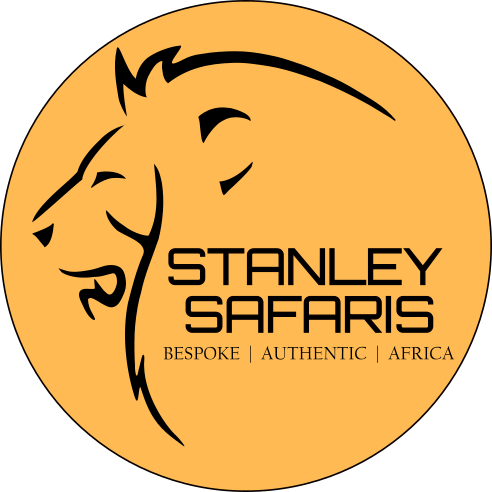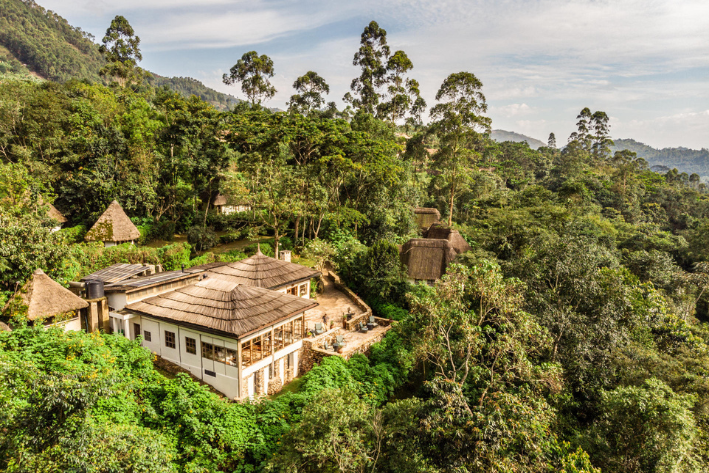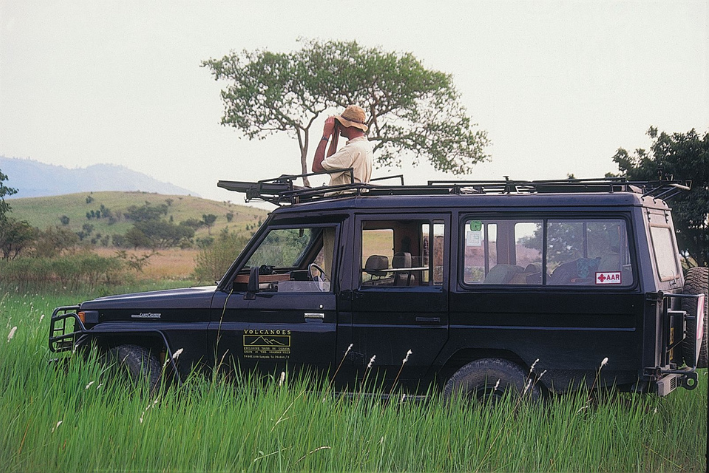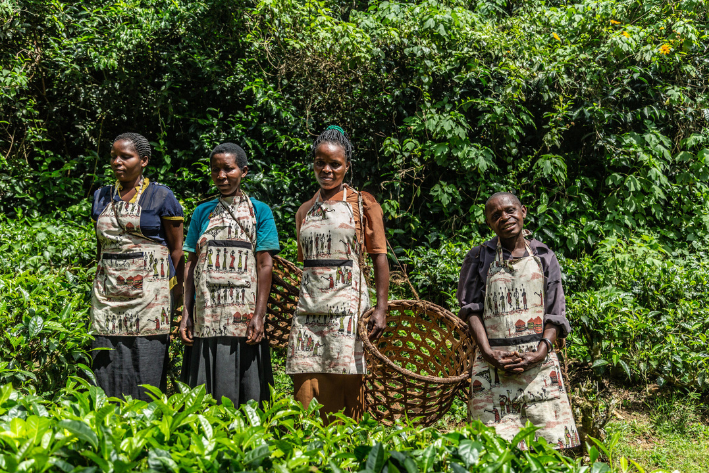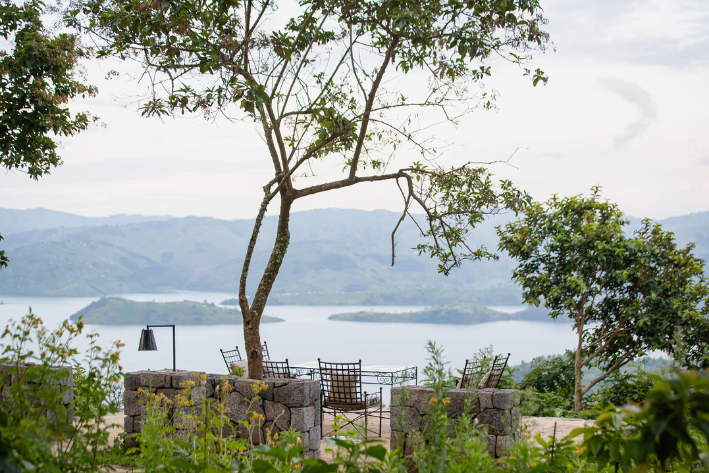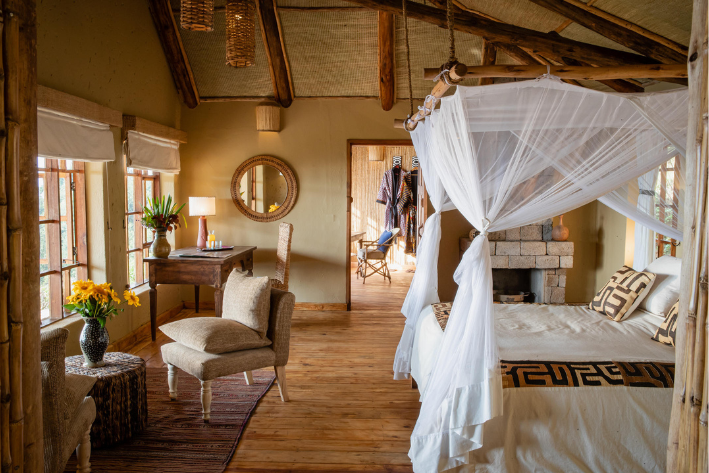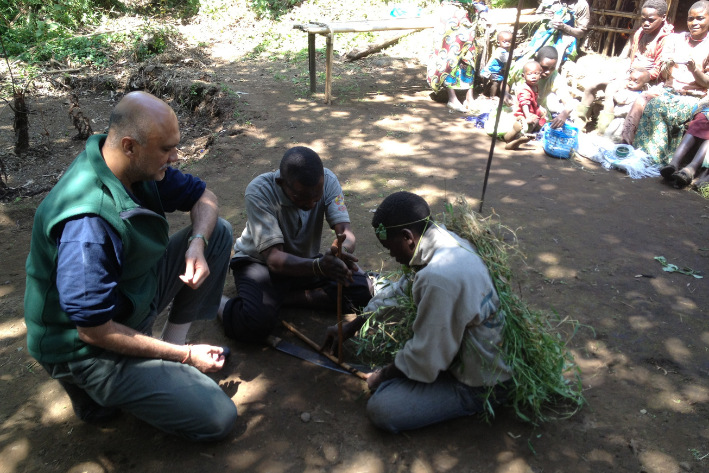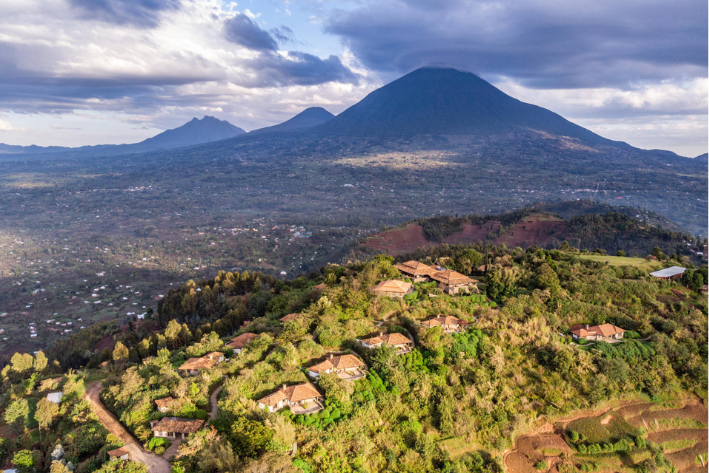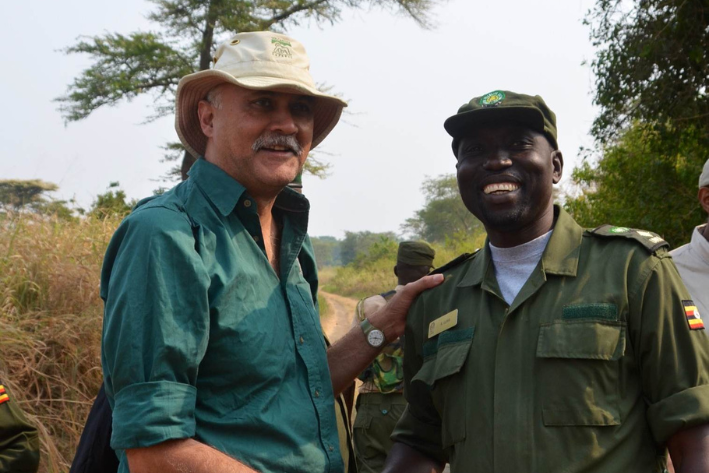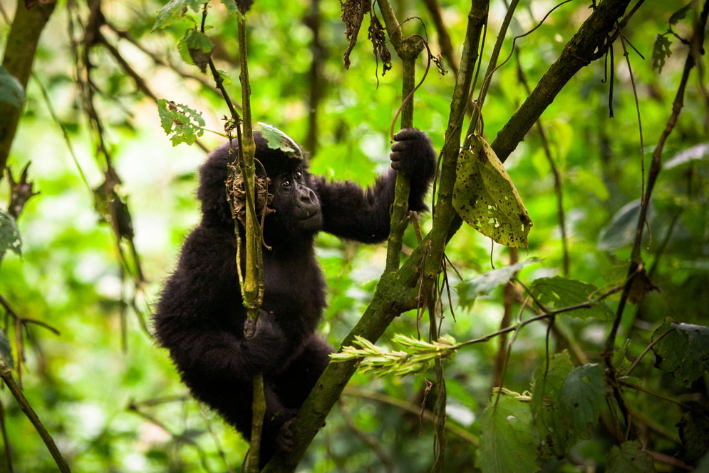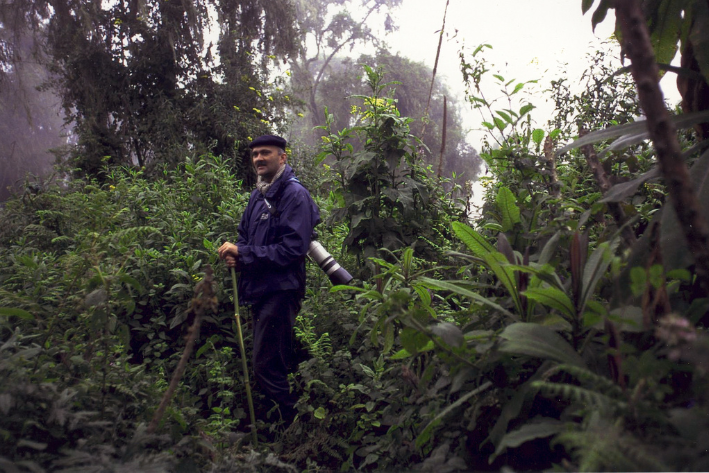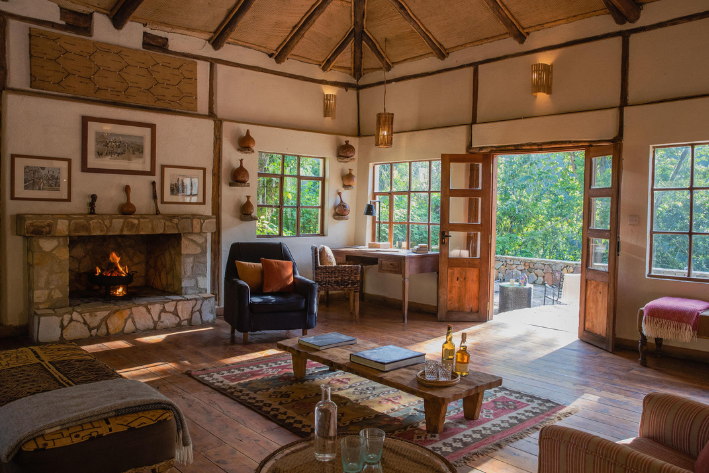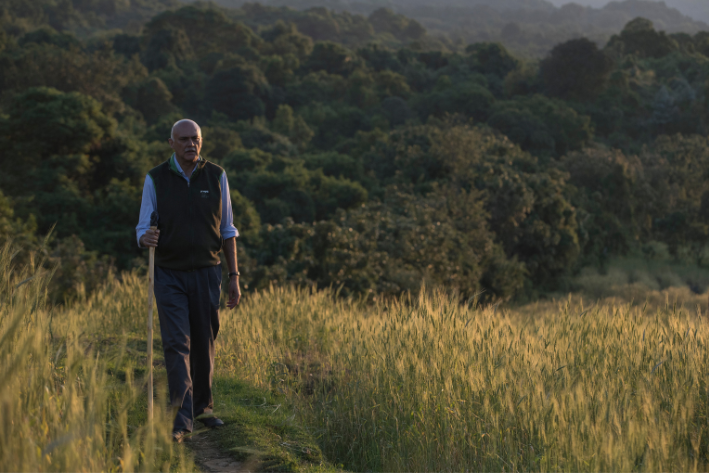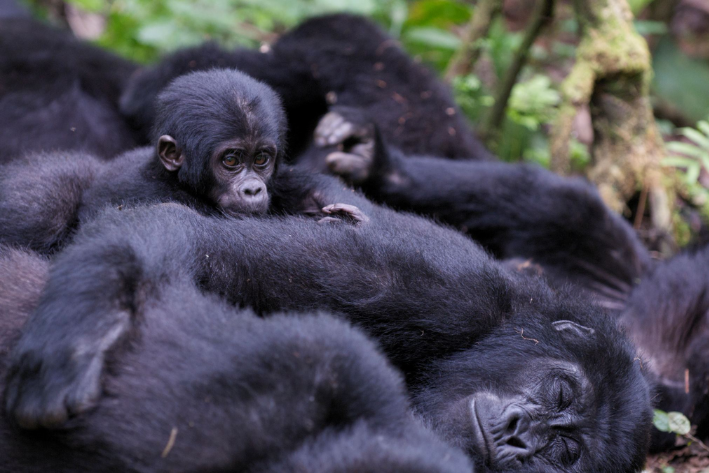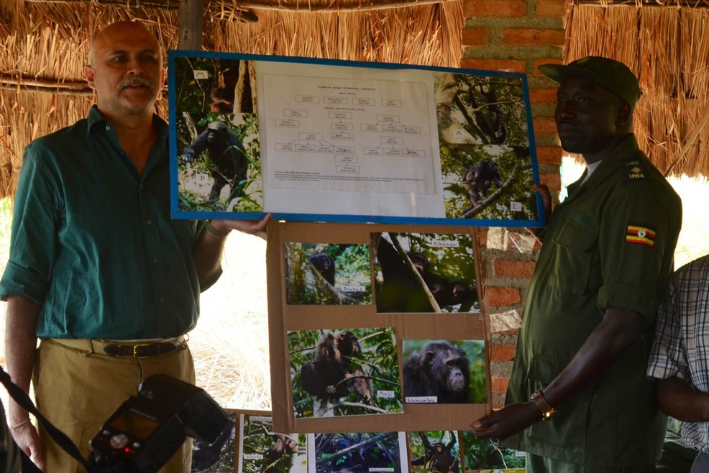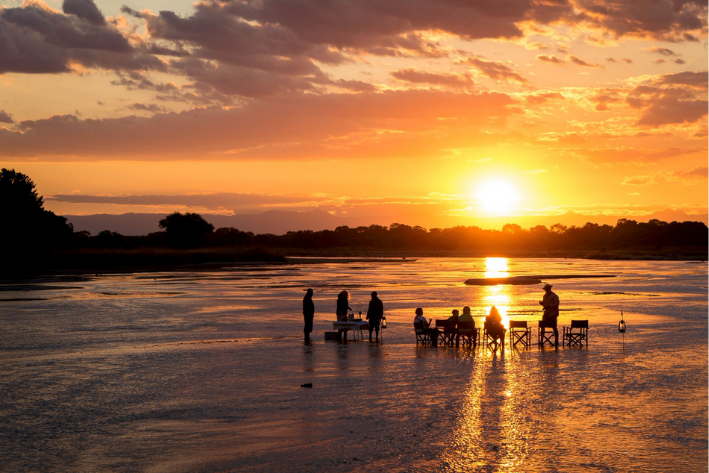We Interview Praveen Moman of Volcanoes Safaris
Learn more about the pioneer behind the first safari camps in the Albertine Rift.
We have the privilege of sitting down with Praveen Moman, the founder of Volcanoes Safaris, to learn more about his amazing conservation efforts with great apes.
It’s a Thursday afternoon when we finally get the chance to sit down with Praveen for our interview. He’s a busy man, and it’s taken us a few weeks to set up this meeting. Shaun and I join our Zoom call from Cape Town, while Praveen connects from his home in London.
We ask about his early life and why he decided to start Volcanoes Safaris. He reflects for a moment.
“I was born in Uganda, but when I was 16, we had to leave in a hurry and come to the UK because of the Asian Expulsion that took place at that time. Many people born in Uganda had to leave and that put them off the country forever – very few went back.
“But in my case, I started going back to Africa 10 years after I left Uganda. I was going for the European Union on foreign affairs and as an aid for development in Africa. I started in South Africa, working on Apartheid issues, and that’s what reconnected me to the continent.
“Quite soon other EU business took me to Kenya and then eventually, led me back to Uganda. Despite the terrible things that had happened there, I couldn’t forget about it, and I went back a number of times. I think part of that is because of my father.
“He came to East Africa from Punjab in 1937, but he’d had various uncles who’d worked in East Africa since 1905, so our family history goes back a long time in the area. My father was a colonial civil servant and worked briefly for the UK and then the Ugandan government, but his real interest was in the wilderness and the wild places of Africa.
“His thirst and passion for this was endless, and so we went anywhere and everywhere as children, exploring the amazing ecosystems and wildlife in the Albertine Rift. But one minute it was there, and then we lost it all.”
Praveen talks about this difficult period in his life philosophically and with amazing composure, but it is clear to see how this affected him as a teenager. I can’t help but feel a sense of deep respect listening to this terrible story and knowing that it didn’t dampen his love for his place of birth one bit.
He continues:
“The long and the short of it is that kind of childhood memory of these places is very strong, and that is really what led me to start Volcanoes Safaris in 1997. We celebrated our 25th anniversary last year, and it has been an unusual and interesting journey. As you know, we were the first people who really got our teeth stuck into all this. There are of course other operators, other people who have camps and lodges in the area, but Volcanoes Safaris was the first.”
Volcanoes Safaris has a total of 4 different lodges with a 5th on the way that all focus on gorilla and chimpanzee populations across Uganda and Rwanda. We ask Praveen where he started.
“We started in Uganda with Mount Gahinga, but let me take a step back. In 1994, there was the genocide against the Tutsis, and although I was not born in Rwanda, I had connections to Rwanda and the DRC, and somehow that really affected me quite badly.
“I just thought, ‘What is going on in Africa? Why is this happening?’ And so in 1995, I went to Southern Uganda. I wanted to go to Rwanda too, but it was a conflict zone. And that was when I thought, ‘I’m going to set up here.’
“So we set up Volcanoes Safaris and Mount Gahinga Lodge in 1997, and then in 1998 I visited Rwanda with the intention of working there too. It wasn’t very stable at the time so we had to let it go, but in 2000, we decided to take guests from Southern Uganda into Rwanda to track gorillas, and in doing so we became the first international company to do so.
“Then in 2002 we coordinated the Diane Fosse Board’s first visit to Rwanda after the war, to mark the hundredth anniversary of when the gorilla was first seen in the Volcanoes Mountains. And that trip made it very clear that there was no accommodation of quality in the area. That’s what led me starting to buying land in 2002 and finally opening Virunga Lodge in 2004.”
Praveen and Shaun chat about the different Volcanoes lodges and which ones Shaun has visited. Then we ask about some of the challenges of working in these isolated areas.
“When we started we set up very simple and basic lodges. There was no artisans and craftsmen, materials were not available and the supply chain wasn’t there. With Virunga Lodge we just managed to build some very simple rooms or ‘bandas’ as they’re called.
“But in the last five years, we’ve transformed and reimagined Virunga to be one of the leading lodges of Africa. If somebody said that to me 25 years ago, I would’ve said unthinkable,” he laughs.
“It was a very, very high commercial risk, for a small company like us. And of course we didn’t know where Rwanda would go. But it’s now well established as a tourism product in the world.”
Praveen goes on to explain that in Rwanda and Uganda, camp sites do not exist and need to be created, which adds another level of complication to expanding the company. Their newest lodge, Kibale, which is set to open in 2024, was simply a hilltop that Praveen saw 15 years ago. He slowly bought the land surrounding it, and now they are transforming it into a lodge where guests can stay while chimpanzee tracking.
Shaun asks Praveen if the company has any future plans for expansion after the Kibale project is concluded.
Praveen thinks for a moment.
“No. We have remained an independent company, family-owned by my wife and I, and we work in a way that suits us. With many safari companies in Africa today, four camps turns into 14 ten years later, and good luck to them. But that involves many partnerships, many other arrangements, and a much bigger infrastructure.
“We will stay small and very careful about what we do. We have three gorilla lodges and two chimpanzee sites. That’s what’s important to us and why we are concerned about this very specific area in the world.
“The Albertine Rift has amazing conservation assets. They’re also, as you know, very threatened. These are very small isolated habitats. If you put it in context, the Serengeti is about 30,000 square kilometres, Yellowstone in the United States is about 70,000 square kilometres, and the gorilla parks are just 700 square kilometres. And all four of them in Uganda, Rwanda and the DRC.
“The mountain gorilla numbers are under 1100. The chimpanzee numbers are more, but they are spread out in many different countries, so our focus really has been to work on great ecotourism and its connection to conservation and communities.”
At Stanley Safaris, we only send our guests to camps and lodges that take conservation seriously, and a large reason why Shaun wanted to interview Praveen was because of the amazing work Volcanoes Safaris is doing with regards to conservation of the wilderness they operate in, as well as the efforts they have made in speaking up for the local communities. We have both been looking forward to what he has to say about the company’s conservation initiatives.
Praveen starts to tell us about the work he is involved in.
“Some years ago I did a TED Talk which made me think about the whole issue that those of us who are privileged tend to focus on the species. We only think about the gorilla and the chimpanzee and other species that matter to us, but working in this environment, you begin to realize that the gorillas or the chimps or other species will only survive if local people have an interest in their survival and get something from it.”
This is not the first time I have heard these sentiments from a lodge owner involved in this important work. It’s inspiring to see that the approach to conservation has shifted in the same way, whether you are talking about protecting rhinos against poaching in South Africa or protecting gorillas against habitat loss in the mountains of Uganda and Rwanda. The individuals spearheading these efforts all realise that their work is in vain unless they actively involve the local communities.
Praveen continues:
“We’re working in our own small and steady way, and we have a selection of community and conservation projects around our lodges. For example in Kyambura, we have created a three kilometre buffer zone to separate the threatened chimp population of just 30 chimps from the human population.
“And at Mount Gahinga, we built a village for the disenfranchised Batwa hunter gatherers. There’s about 150 people living there. These are small scale, but they are the things that matter to us. We’re not just setting up properties for the sake of it, but we’re also involved in the surrounding areas.”
Shaun asks Praveen to talk a bit more about the Batwa community.
“The Batwa people are one of the oldest indigenous peoples on the African continent and lived forever in the forests of Africa. But sadly, as has often happened in different parts of the world where national parks have been created, there’s been a drive to say ‘we must look after the animals and get rid of the people.’ And so in Uganda when the national parks were created, the Batwa people were asked to leave without any compensation or possibilities of other land.
“When I first started working in Mount Gahinga, I had to confront some of the stereotypes of these people that I had been exposed to as a child growing up in Uganda. We started working with them, and we would take guests to their make shift village.
“But this started to bother me. I realised that all we were really doing was sharing human misery, and so we decided to buy some land – I think it is now about 25 acres – to make it possible for these people who had been displaced to have a proper home and build an actual village.
“We are not responsible for these people, but we are connected to them, and so we are trying to support them in a way so that benefits them. We sometimes take our guests to see the village as a way of sharing this experience and learning from it.
“We have a lot to learn from the Batwa people. They have lived for centuries in the forest without any of the things we’ve done and they lived well.”
Listening to Praveen makes it easy to see how important his work is to him. He is a successful business man who has built a legacy in an area where people were scared to invest, but his success is built on his love for the area he operates in. Like his father, he has a deep appreciation for this magnificent corner of the globe, and has made it his life’s mission to protect it and share it with others.
As the man who first set up luxury lodges in the gorilla and chimp tracking hotspots of Africa, Praveen knows exactly where to go for this life changing experience. We ask him about his experiences.
“I haven’t kept a record of how many times I’ve tracked the gorillas, but I would guess between 20 and 25 different times. I’ve tracked the Western Lowland Gorilla in Gabon, Cameroon and the Central African Republic, and I have tracked Mountain Gorillas in Uganda, Rwanda and the DCR.
“Nowadays I am busy with running the business and with my other work, and so I tend to only go when I was a friend or a family member travelling. The last time I went was a few years ago at Mount Gahinga when a friend from London visited, and then a couple of years before that with my son.”
Shaun gets a lot of questions about where the best gorilla tracking takes place. He poses the question to Praveen, who pauses to consider his answer.
“I think the Albertine Rift is a very blessed area. It has some of the most interesting and unique forest zones in the world, and so in my opinion, I would go to more than one gorilla site if it is possible.
“For example we have one suggested itinerary where you fly into Kigali, and then we take you over the Ugandan border to Bwindi, where there is just one habituated family who are all very friendly and playful, and then we take you back to Rwanda to Virunga Lodge where there are a dozen habituated families. This combination makes it a very deep experience.
“It is a special and unique experience every time you see the gorillas, and that is why I always encourage guests to go more than once if they can. Every family, every setting, every interaction in different and very special.”
It is always inspiring to talk to the individuals who are dedicating their time, energy and finances towards protecting Africa’s wild spaces. Praveen is no different. He cares deeply for this deep jungle. It is the home that didn’t want him and yet he has spent his life trying to share and protect. It is a privilege to listen to him talk, and to share his passion with us. We cannot wait to see what Volcanoes Safaris does next, but with Praveen at the helm, we’re confident it will be great.
